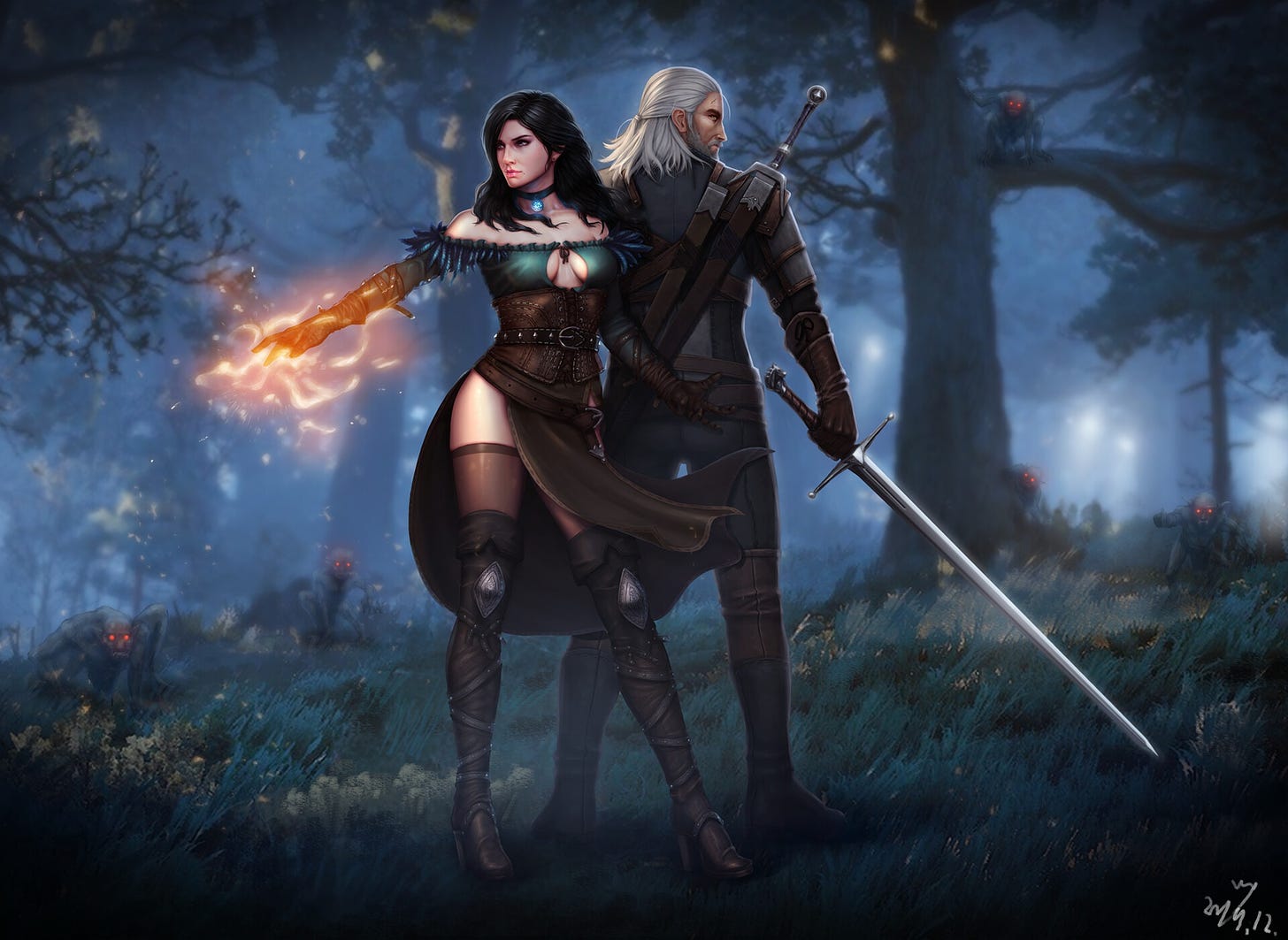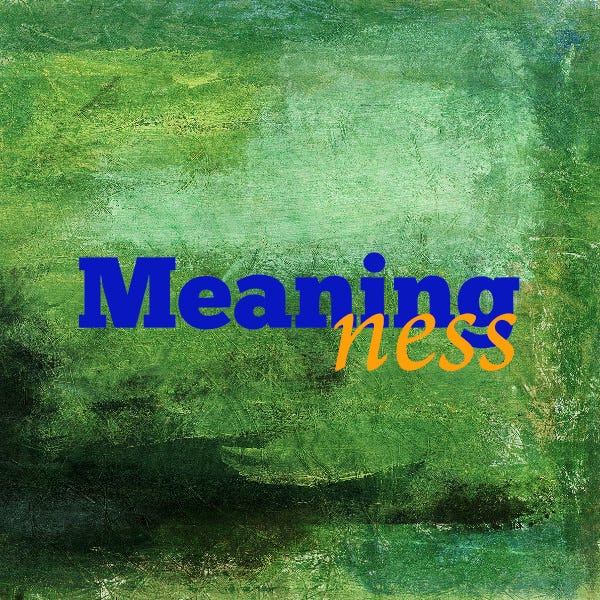The most important knowledge in the world
Plus! Live Zoom AMAs; my purposes in writing; shifting to Substack Notes; and the prevalence of witches
In this issue:
The most important knowledge in the world
Upcoming live Zoom AMAs (Ask Me Anything)
What am I doing here anyway? My purposes in writing
Why I’m shifting to Substack Notes
Witches hexed my homework
This is a monthly “News and Notes” post; they’re about The Making Of, discussing my process.
Index to the most important knowledge in the world
That’s the title of a new web page on my Meaningness site. It collects, links, and summarizes my writing on adult developmental stage theory and its implications. Currently that’s scattered over several web sites, so this is a hub for all of them. It also includes summaries of planned but unwritten essays, to give a sense of the scope of the material and why I think it’s important.
The title is humorously hyperbolic. However, I do believe stage theory may be the most significant idea we have, if it is true and if it implies what I hope it may. It may be the key to escaping our current stagnation and malaise, and moving as individuals and whole societies into more effective and enjoyable ways of being.
Upcoming live Zoom AMAs
, who teaches Vajrayana Buddhism, holds weekly video office hours. This Sunday, July 7th, I’ll be on tap to answer as well. Well, not as well; he actually knows what he’s talking about and will answer much better than I can. But I’ll be there if you want to Ask Me Anything about Vajrayana Buddhism. It’s 9am–10am Pacific Time. If you’d like to join, it’s at https://calendly.com/fieldmeditation/office-hours?month=2024-07 (and is free).I’ll also be co-hosting monthly AMAs (Ask Me Anything) for Evolving Ground, the Vajrayana organization co-led by my spouse
. The first one will be Saturday, August 10th, at 7:30am Pacific Time. (Which is pretty early if you are in that time zone, but is a compromise for global availability.) There isn’t a link yet; I’ll post it in next month’s News & Notes.What am I doing here anyway? My purposes in writing
Half a year of posting my writing to Substack, rather than on my own sites, has changed the way I imagine relating to you, a reader. It’s difficult to pinpoint quite how!
It’s prompted me to think often about what, overall, are my purposes in writing. Much of it has always been personal intellectual curiosity. I learn most by writing, and I enjoy that. However, I also want to be as useful as possible, and it’s an ongoing open-ended question how best to do that.
I want to help guide us out of “our current stagnation and malaise,” so we can “move as individuals and whole societies into more effective and enjoyable ways of being.” This aim, though somewhat nebulous, seems the most important in the world to me.
I suspect the most effective way to do that is to help level up the people who will be most likely able to effect change for the better. This is somewhat uncomfortably elitist. It implies writing stuff that most people won’t understand or find useful: for example, about navigating the stage 4 to stage 5 transition, which (according to not-especially-credible research) can be meaningful to only 1–5% of the population.
In a sense, it implies that my aim is to mentor the future’s ruling class. That could include writing about meta-systematic leadership, for example. That is mainly feasible only for those who are in positions of authority in substantial organizations, or who will take them.
There is a trade-off between short-term impact and long-term value. There is another between growing an audience and targeting more precisely the audience that can be most effective.
I write well. I can easily be entertaining, and could easily produce superficial, bite-size, forgettable “insight porn” posts. I could turn out way more of those than the difficult stuff, and gather a larger audience rapidly. It’s a temptation, but it’s “audience capture”: getting diverted from what I care about into producing stuff more people want to consume. I want to avoid that.1 Primarily, I want to be useful, although I enjoy adding some entertainment lest it get too dry.
The majority of the people who would most benefit from what I have to say have probably never encountered my writing. It seems that increasing overall readership is necessary to make it well-enough known to reach everyone who can make good use of it.
That probably implies producing a mixture of difficult and esoteric stuff with more accessible and broadly-useful stuff. Which… is what I have been doing! How best to balance the trade-offs will continue to occupy my thoughts, however.
Why I’m shifting to Substack Notes
I’ve loved Twitter for fourteen years now. I still do. And I’m shifting much of what I do on Twitter to the new-ish Substack Notes network.
A main reason I’ve found Twitter useful and enjoyable is that I can talk to pretty much anyone, and pretty much anyone can talk to me. In the past couple years, many people have left for smaller alternatives which work better for them. I’ve tried those, but they don’t have “everyone” on them, the way Twitter does.
Most of the people I would want to talk to subscribe to at least one Substack newsletter, which means they are “on” the Notes network—although they may not realize that. Substack, the company, hasn’t done a great job of explaining and publicizing Notes. But more and more people are discovering it and participating.
It’s in a sweet spot where there’s frequent interaction with interesting people I hadn’t known before, and yet it is not overrun with trolls. It’s friendly, thoughtful, and intelligent. Increasingly, “everyone” can talk to me there, and I can talk to “everyone”—or at least a sizeable fraction of the people I’d want to interact with.
Notes is better than Twitter for medium-length content—from one to six paragraphs. I use it almost daily to post brief essays, usually to recommend, contextualize, and respond to a Substack post I’ve found interesting. Often this leads to interesting conversations in the comment threads. My Notes posts typically get more and better replies than my Tweets, even though I have ten times as many followers on Twitter, and probably most of my Substack followers are unaware of Notes.
You can see a feed of all my Notes here. If you use the Substack app, or visit the Substack front page when logged in, you’ll see Notes from everyone you follow, along with their Posts (full-length essays). Alternatively, if you receive Posts by email, you can get emails for Substack Notes too, by logging in and going to Settings > Notifications and enabling “New Notes.”
Join me on Notes!
Witches hexed my homework
In last month’s News & Notes, I said that:
History shows that my predictions of what I will write next are completely worthless. However, I expect the next two posts to be “Oblivious technical management rationalism” and “Unavailable dakini catalyst.”
I did post the first. I had to set the second aside, after a week’s work.
One reason my predictions for what I will write next are almost completely worthless is that it is difficult to estimate how hard it will be to write a particular piece; or whether I’m ready to write it at all. It may require much more effort than I expected; or it may need years more reflection before I’m capable of it.
Much of what I publish was initially drafted long ago—more than twenty years ago, in some cases. My understanding of a topic gradually accumulates, and at some point it’s ready to actually write up. Typically the final writing is 10% or less of the total effort; the rest is background reading, thinking, note-taking, and directed research to check sources while writing.
I wrote that “Unavailable dakini catalyst” is “about how falling in love with someone you can’t get may blow up your whole carefully-shielded system of life, forcing you out of developmental stage four and into the storm-tossed ocean between it and stage five.” It will be illustrated with four true stories; three from my own experience.
Understanding my own romantic history from ten to forty years back is not easy—intellectually or emotionally. I am not the same person, and the sense I make of events in retrospect is not the same as the sense I made of them then. The stories need to include both.
I am not the same person in part because of the incidents the piece will describe. They forced developmental stage transitions, and the essence of those is qualitative changes in the way you make sense of matters of meaning.
The upshot is that I still hope to write this “soon.” But perhaps it will need to percolate for another twenty years.
In the meantime, I noticed with surprise when drafting the four stories that everyone in them is a witch. At first I thought this was a very weird coincidence. And then I remembered Geralt of Rivia, the hero of The Witcher. He has a sometimes-unhealthy weakness for sorceresses.
I have a sometimes-unhealthy weakness for witches.
(This made me wonder about the distinction between “sorceress” and “witch.” It’s a bit subtle. What do you think the difference is? Which would you rather be? Which would you rather romance?)
Anyway, since I don’t like to take the blame for anything, I want to blame my non-delivery of the promised post on malevolent witches.
In the same newsletter issue, I had a section titled “Podcasting: harder than it sounds,” which mentioned that I’ve made many failed attempts at recording episodes recently. A couple weeks later,
and I succeeded with “Lineage and learning.”Last week,
and I also did a fantastic episode about Ultraspeaking. Unfortunately, I forgot to press the record button before starting.That was obviously due to a hex.
The most common form of audience capture is opining about culture war politics, and getting pulled into expressing increasingly extreme views by the most vocal members of the audience. There is zero probability of my doing that, fortunately.







Interested to see the daikini post (here's hoping it happens!). I think I had a similar experience a few years ago, although I handled it badly and I think I became a better person afterwards, rather than having any obviously developmental stage changes.
The one thing I can think of was that they made me more aware of relationships between people as a kind of "system" that can be manipulated, rather than it just being the fabric of reality. Would like to see your take on your experiences!
From the fantasy I've read I've gotten the impression that sorceresses tend to be higher class, use a rather 'technical' sort of magic, and have a high probability of being evil. Witches tend to be lower class, use more intuitive, 'natural' magic, and are more likely to be good than sorceresses.